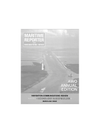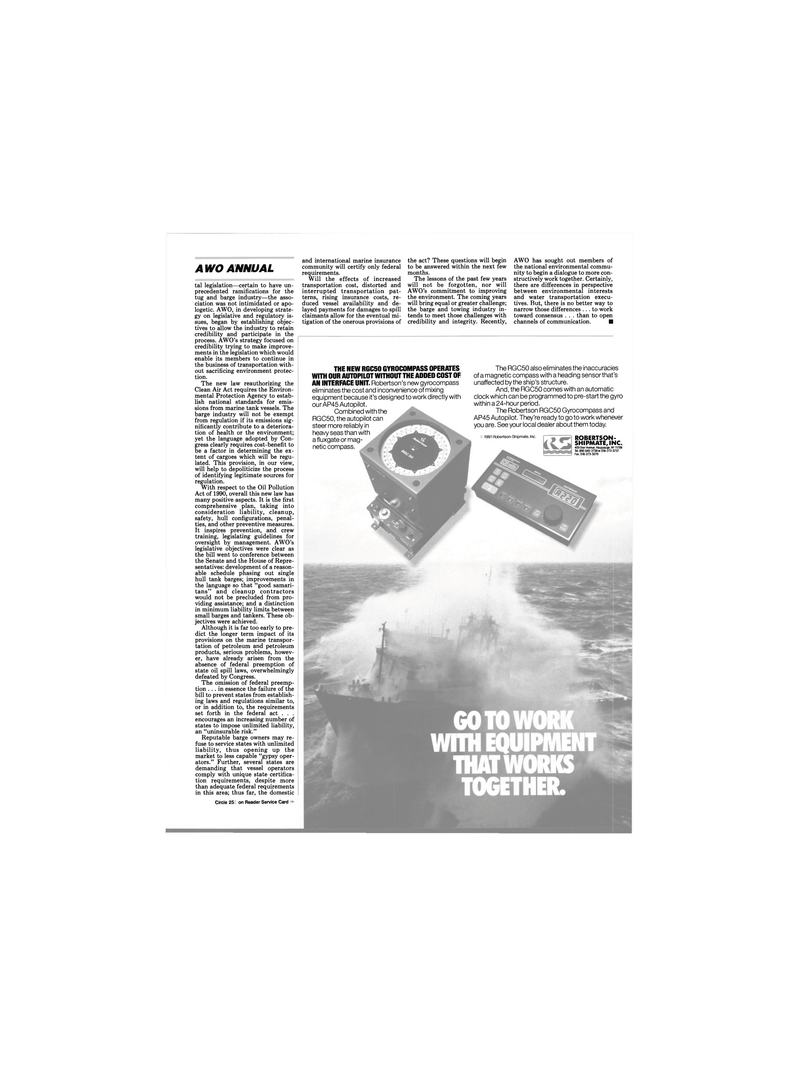
Page 24: of Maritime Reporter Magazine (March 1991)
Read this page in Pdf, Flash or Html5 edition of March 1991 Maritime Reporter Magazine
A WO ANNUAL tal legislation—certain to have un- precedented ramifications for the tug and barge industry—the asso- ciation was not intimidated or apo- logetic. AWO, in developing strate- gy on legislative and regulatory is- sues, began by establishing objec- tives to allow the industry to retain credibility and participate in the process. AWO's strategy focused on credibility trying to make improve- ments in the legislation which would enable its members to continue in the business of transportation with- out sacrificing environment protec- tion.
The new law reauthorizing the
Clean Air Act requires the Environ- mental Protection Agency to estab- lish national standards for emis- sions from marine tank vessels. The barge industry will not be exempt from regulation if its emissions sig- nificantly contribute to a deteriora- tion of health or the environment; yet the language adopted by Con- gress clearly requires cost-benefit to be a factor in determining the ex- tent of cargoes which will be regu- lated. This provision, in our view, will help to depoliticize the process of identifying legitimate sources for regulation.
With respect to the Oil Pollution
Act of 1990, overall this new law has many positive aspects. It is the first comprehensive plan, taking into consideration liability, cleanup, safety, hull configurations, penal- ties, and other preventive measures.
It inspires prevention, and crew training, legislating guidelines for oversight by management. AWO's legislative objectives were clear as the bill went to conference between the Senate and the House of Repre- sentatives: development of a reason- able schedule phasing out single hull tank barges; improvements in the language so that "good samari- tans" and cleanup contractors would not be precluded from pro- viding assistance; and a distinction in minimum liability limits between small barges and tankers. These ob- jectives were achieved.
Although it is far too early to pre- dict the longer term impact of its provisions on the marine transpor- tation of petroleum and petroleum products, serious problems, howev- er, have already arisen from the absence of federal preemption of state oil spill laws, overwhelmingly defeated by Congress.
The omission of federal preemp- tion ... in essence the failure of the bill to prevent states from establish- ing laws and regulations similar to, or in addition to, the requirements set forth in the federal act . . . encourages an increasing number of states to impose unlimited liability, an "uninsurable risk."
Reputable barge owners may re- fuse to service states with unlimited liability, thus opening up the market to less capable "gypsy oper- ators." Further, several states are demanding that vessel operators comply with unique state certifica- tion requirements, despite more than adequate federal requirements in this area; thus far, the domestic
Circle 256 on Reader Service Card and international marine insurance community will certify only federal requirements.
Will the effects of increased transportation cost, distorted and interrupted transportation pat- terns, rising insurance costs, re- duced vessel availability and de- layed payments for damages to spill claimants allow for the eventual mi- tigation of the onerous provisions of the act? These questions will begin to be answered within the next few months.
The lessons of the past few years will not be forgotten, nor will
AWO's commitment to improving the environment. The coming years will bring equal or greater challenge; the barge and towing industry in- tends to meet those challenges with credibility and integrity. Recently,
AWO has sought out members of the national environmental commu- nity to begin a dialogue to more con- structively work together. Certainly, there are differences in perspective between environmental interests and water transportation execu- tives. But, there is no better way to narrow those differences ... to work toward consensus . . . than to open channels of communication. •
THE NEW RGC50 GYROCOMPASS OPERATES
WITH OUR AUTOPILOT WITHOUT THE ADDED COST OF
AN INTERFACE UNIT. Robertson's new gyrocompass eliminates the cost and inconvenience of mixing equipment because it's designed to work directly with our AP45 Autopilot.
Combined with the
RGC50, the autopilot can steer more reliably in heavy seas than with afluxgate or mag- netic compass.
The RGC50 also eliminates the inaccuracies of a magnetic compass with a heading sensor that's unaffected by the ship's structure.
And, the RGC50 comes with an automatic clock which can be programmed to pre-start the gyro within a 24-hour period.
The Robertson RGC50 Gyrocompass and
AP45 Autopilot. They're ready to go to work whenever you are. See your local dealer about them today. 1991 Robertson-Shipmate, Inc. ROBERTSON-
SHIPMATE, INC. 400 Oser Avenue, Hauppauge, NY 11788
Tel. 800-645-3738 or 516-273-3737
Fax. 516-273-3270

 23
23

 25
25
